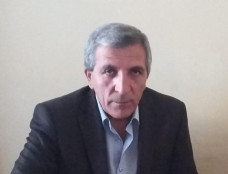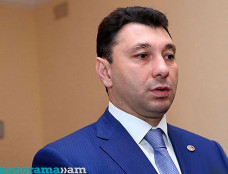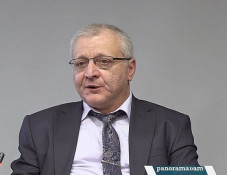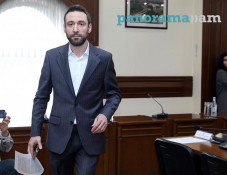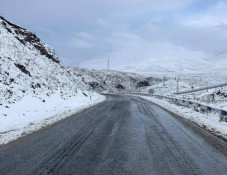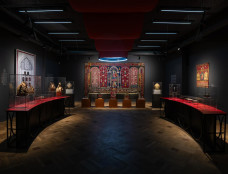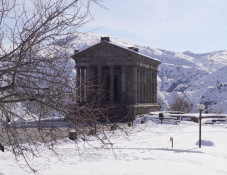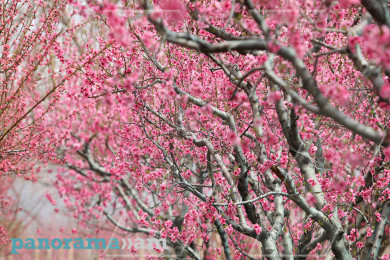
Rouben Galichian references Medieval Christian travellers and chroniclers’ evidence on Armenian presence in Caucasus
In this section, the writings of twelfth to nineteenth-century Christian travellers and researchers will be considered and analysed, where they refer to Albania, Azerbaijan and Armenia, famous cartographer Rouben Galichian writes in his book Historical and Geographical Falsifications of Azerbaijan, a historical, cultural and cartographical research based on a detailed analysis backed by documentary evidence.
The 13th century English chronicler and historian Gervase of Tilbury (c. 1180-1228) writes the following about the Caucasian Albania/Aghvank in his opus magnum, the Otia Imperialia (Recreation for an Emperor), a historical and geographical work about the countries of the world: … to the peaks and passes of the Caucasus in the south, there live thirty-four tribes. However, the general name for the nearest part of this area is Albania. Beyond it, towards the sea, the Amazones inhabit.
Ebstorf Mappa Mundi, which is believed to be compiled by Tilbury, depicts Armenia and adjacent regions and has a significant amount of commentary and historical data. Here is what he writes about Aghvank in the comments of the map: “In this land, which is called Albania [Aghvank], there live 26 tribes. ... In the east the land begins at the Caspian Sea and stretches along the shores of the northern ocean over many lands to the Meotidian [Azov] Marshes.”
In the book, as well as in the map, Armenia is mentioned in several places, and the following description is given: “The region of Armenia lies between Taurus and Caucasus, stretching from Cappadocia to the Caspian Sea. To the south-east it has the Acroceraunian Mountains, the hills in which the Tigris has its source. It is said that it was also in these mountains that the Ark came to rest after the flood, on the highest peak in the Taurus range commonly called Ararat. Ararat is also an area of flatland in Armenia.”
Gervase confirms the existence of Aghvank and Armenia in the Middle Ages, while he makes no mention of Azerbaijan in either the text of the book or the map, Galichian notes.
He next refers to William de Rubruck (1220-1293), a Dutch missionary who travelled from Constantinople to the Mongol lands and the Karakorum Desert during 1253-55. On his return, he passed through the Caucasus and Armenia, of which he provides descriptions of great interest. In his memoirs, he talks about South Caucasian peoples such as the Alans, Caucasian Tatars, Persians and Armenians and the lands they inhabit, but makes no mention of Azerbaijan or Azerbaijanis, Galichian writes.
Marco Polo (1254-1324), too, provides detailed information about the Caucasus, Armenia and neighbouring regions in his accounts. He writes about the territory, towns, religion, trade and connections of Greater Armenia and Lesser Armenia. When writing about Georgia and Teflis (Tbilisi), he states the following: “In this province there is a handsome city named Teflis, around which are suburbs and many fortified posts. It is inhabited by Armenian and Georgian Christians, as well as by some Mahometans and Jews; but these last are in no great numbers.”
Marco Polo makes no mention about Aghvank, Azerbaijan and Azerbaijanis in his memoires.
In book one of his Polychronicon, Ranulf Higden, an English chronicler and historian, provides mainly geographical information about Armenia, Georgia, Aghvank, the Caucasus Range, Caspian Sea and neighbouring areas: Albania that land has in the east side the sea Caspius, and stretches downward … the waters that has Meotides [Azov]… the hounds of that land are so [violent], so grim, and strong that they throw down bulls and [kill] lions.
He writes about Armenia in the following passage: Armenia, that is also called Ararat, has the name of Armenius, Iason’s knight, who took the land that stretches from by the mount Taurus and Caucasus to the see Caspius and Cappadocia. There is that Mount Ararat, there Noah’s Arch landed after the flood. And there are two Armenias, the Greater and the Lesser.
Next, Galichian refers to Johann Schiltberger, a German soldier who was captured by the army of Sultan Bayazid I and served him until 1402. After the Sultan’s defeat, he was enlisted to fight for Timur Lang, after whose death he also served his son and grandson, who often raided Armenia. He writes the following about the local Armenians in his memoirs: “I have also been a great deal in Armenia. After Tamurlin died, I came to his son, who has two kingdoms in Armenia. He was named Scharoch; he liked to be in Armenia, because there is a very beautiful plain. He remained there in the winter with his people, because there was good pasturage. A great river runs through the plain is called the Chur, and it is also called the Tygris and near this river, in this same country, is the best silk. The Infidels [Muslims] call the plain in the Infidel tongue Karawag [Karabakh], the Infidels possess it all, and yet it stands in Ermenia. There are also Armenians in the villages, but they must pay tribute to the Infidels.”
Given that Schiltberger’s evidence ‘was unacceptable’ for Zia Buniatov, an Azerbaijani academician, he removed most of the information about Armenia while editing the translation of the book for a reprint in 1984. For his coup de grace, he completely removed six chapters from the book covering Armenia and Armenians, Galichian notes and adds that Schiltberger makes no reference to Azerbaijan or Albania.
Ruy Gonzales de Clavijo was a Spanish traveller who spent two years (1403-1405) in Timur Lang’s court as the ambassador for Henry III of Castile. He travelled through Western and Eastern Armenia, hence the fourth chapter of his travelogue is entitled ‘Trebizond and the Journey through Armenia.’ It includes a description of Yerznka: “This city of Arsinga [Yerznka] … was built by Armenians, and the sign of the cross is cut on many parts of the walls. ... It is inhabited by many Christians, Greeks, and Armenians.”
Elsewhere, he writes: “At noon they [Clavijo’s entourage] came to a town called Azeron [Erzrum], which belonged to Timur Beg. … In there is a handsome church, for this city used to belong to the Christians of Armenia and many Armenians lived in it.”
Then he continues: “On Tuesday they passed the night in a town called Naujua [Nakhijevan, referred to as Nakhui or Nashui in Persian]; … In this place there was a Caxic [possibly a Turkic term for governor], who received the ambassadors very well; and there were many Armenians.”
Regarding the Armenian religious centre, Echmiadzin, he writes: “On Thursday, the 29th of May, at noon, they reached a great city called Calmarin [Echmiadzin], and from it, distant about six leagues, they saw the great mountain, on which the Ark of Noah rested, after the flood. ... The greater part of the inhabitants were Armenians; but the land of Armenia has been taken from the Christians by the Moors [Timur Lang]…”
In the chapter afterwards, Clavijo writes about his passage through Azerbaijan. When writing about Azerbaijan, he mentions the cities of Khoy and Tabriz, which conveys to us his impression of Azerbaijan being the Iranian province. He does not mention Albania or the Albanians.
A Venetian politician, trader and traveller, Josafa (Giosafat) Barbaro (1413-1494) travelled to Persia from 1471 to 1478, on his way passing through Armenia. Before reaching Tabriz, he mentions his encounters with the Armenians of Tarson, Adana, Mardin, Bitlis, Vostan (Van) and Khoy. He also provides with information about the Armenians of Bayburt, Yerznka, Khlat, Khnus and Arjish. When passing from Lori to Shamakhi he recalls the following: Shamachi… lies towards the sea of Bachu [Baku], within six days, which sea is on the right hand of it, and on the left hand is Mengrelia, towards the sea Maggiore [the Black Sea], and Caitahcchi [Kutaisi], that is situated in the area of the Caspian mountains. This [Shamakhi] is very good city; it has between four and five thousand houses, and makes silks, linen ... It stands in the great Armenia and a good part of the inhabitants are Armenians.
From 1557 onwards, the British merchant Anthony Jenkinson (1529-1610) travelled to Moscow and Persia four times as the British representative of the Crown and the Moscow Company. In his travelogues, he writes the following about the city of Shamakhi: This city is distant from the sea, with camels seven days journey, but now being much decayed, and chiefly inhabited with Armenians.
Concerning Azerbaijan, he states: “This towne Ordowill [Ardabil] is in the latitude of 38 degrees, an ancient citie in the prouince of Aderaugan [Azerbaijan] wherein the princes of Persia are commonly buried…” By this, Jenkinson provides further testimony that Azerbaijan is the northwestern province of Iran. In the 1886 edition of the book, the editor Edward Delmar Morgan has added the footnote: “The Media of Atropates, commander of the Median contingent at the battle of Arbela, included the basin of Lake Urumiyeh, as well as the valleys of the Arazes, Sefid Rud [near the Iranian city Rasht], and Low Countries of Talish and Ghilan, on the shores of the Caspian.” These territories nearly correspond with the modern Iranian province of Atrpatakan.
Galichian also cites Sir John Chardin, famous British traveller who visited Georgia, Armenia, Persia (Including Nor Jugha) in late 17th century and described in detail the Armenians’ lifestyle, traditions and customs. Cartwright writes the following about Armenia: “To the small or Lesser Armenia they assign for Bounds, the Great Armenia to the East, Syria to the South, the Black Sea to the West, Cappadocia to the North, and they place the Greater Armenia between Mesopotamia, Georgia, Media and Armenia the Less.”
Here is what Chardin writes Yerevan and its inhabitants, “Erivan, by the report of the Armenians, is the most Ancient inhabited place in the World. For they affirm Noah and all his Family dwelt there, both before the deluge and after he descended from the Mountain where the Ark rested, and that here was also the Terrestrial Paradise.” Chardin’s work indicates that from ancient times to the present, the region south of the Caucasus has been continuously populated by the Armenians, Galichian writes.
Esai Hasan Jalaleants wrote A Brief History of the Aghvank Region, whose Russian translation edited by Buniatov was published in 1989. He writes the following about the Armenians of Albania: By royal decree the properties and animals of all Armenian and nonArmenian villages were listed; Armenians who had been oppressed, especially the people of Kutkashen and Poghar villages protested against Shamakhi’s Malek Mahmud; The Armenians and other Christians living the towns and villages near Shamakhi did not suffer much; The moveable assets of the Georgians of Keghi, including their expensive personal items and animals were confiscated. This happened not only in the Muslim districts of the town, but in the Armenian districts as well.
According to Galichian, this book, published in Baku, proves that until very recently, the Azerbaijani historians did not deny the presence of Armenians in the territory of the historic Aghvank. However, the fact was gradually subjected to denial, and the contemporary historians refute it totally.
Among other evidence, Galichian also refers to John Cartwright, a British traveller and fellow of Magdalene College, Oxford (1603); Alexandre de Rhodes (1591-1660), a French preacher and traveller; Adam Olearius (1603-1671), a German scientist; Jean Baptiste Tavernier (1605-1689), a French traveller; Jonas Hanway (1712-1786), an English merchant; James Morier (1780-1849), an English diplomat and special envoy to the Shah of Persia; Sir William Ouseley (1769-1842), a British orientalist; Guy Le Strange (1854-1933), a French-English historian and orientalist, and many others. They all evidence the Armenians’ presence and existence in the South Caucasus region, in the territory of modern Azerbaijani Republic and the Republic of Armenia.
To be continued.
Born in Tabriz, Rouben Galichian is a descendant of refugees from Van who survived the Genocide. He received scholarship and studied engineering at Aston University, Birmingham (UK). Since in 1981, he started to study the rich cartographical heritage in the libraries of the UK and other European countries. His first research, Historic Maps of Armenia (in English), was published in 2004. It was a collection of maps from various libraries and museums in the world, where Armenia was noted, beginning from the 6th century to the present times. His second book, Armenia in World Cartography, was published in Yerevan in 2005. The research ‘Countries South of the Caucasus in Medieval Maps. Armenia, Georgia and Azerbaijan’ (in English and Armenian) was published in 2007. The book The Invention of History (in English) was published in 2009.
In his book Historical and Geographical Falsifications of Azerbaijan, published in 2013, the author details the reasons, aims and methodology of the falsification of the history of Azerbaijan and the countries of the region.
Related news
- Rouben Galichian exposes Azerbaijani scholars’ falsifications of their own sources about Armenia and Armenians
- Rouben Galichian references C9-14th Islamic sources about Armenia and Armenians
- Rouben Galichian compiles evidence on Armenian presence in Caucasus from Greco-Roman sources of C5-1 BC
- Rouben Galichian refutes Azerbaijani theory about ‘Armenians being newcomers’ to South Caucasus
- Rouben Galichian exposes myth of ‘divided Azerbaijan’ and Azerbaijani scientists’ falsifications of sources
- Rouben Galichian exposes Azerbaijani historiography’s contradictions to sources and even its own theories
- Rouben Galichian: Azari is Iranian dialect, Turkic language was introduced in region of in C11 with nomad Oghuzes
- Rouben Galichian: For Azerbaijani historians, issues of their people’s origin are flexible and alterable theories
- Rouben Galichian: Ziya Buniatov played key role in setting ground for conducting anti-Armenian propaganda in Azerbaijan
- Rouben Galichian: Falsification of Azerbaijan’s history begins from school textbooks and youth believes in that lie
- Historical and Geographical Falsifications of Azerbaijan. Rouben Galichian argues on aims of appropriating others’ history
Newsfeed
Videos








